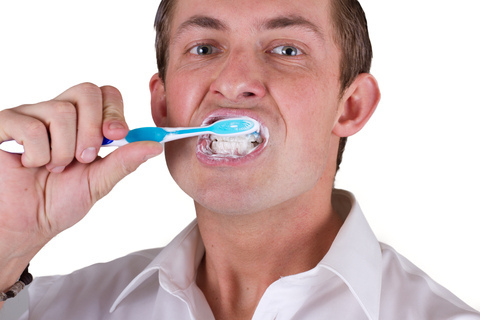September 24th, 2024

In a world where everything moves so quickly and teens and young adults find themselves pulling “all-nighters” or working long hours, energy drinks have grabbed the spotlight. You’ll have one (or three) and suddenly you have the drive you need to keep going.
The same can be said for sports drinks. It’s common for people to have one even when they’re not engaged in any strenuous physical activity, which is what they were designed for. People will drink them simply because they’ve grown to love the taste.
Although they might taste great and boost your energy, there’s a serious down side to consuming energy and sports drinks on a steady basis. Studies have shown that these drinks contain so much acid that they start to destroy your teeth after just five days of consistent use.
The acid in these drinks destroys your tooth enamel, which makes your teeth more vulnerable to bacteria. This can progress to staining, tooth decay, and hypersensitivity.
That’s why Dr. Richard Haley and our team want to encourage you to try to limit the amount of sports and energy drinks you consume. If you do enjoy either or both of these drinks, you should make it a habit to rinse your mouth with water immediately after consumption, and brush your teeth about an hour later, after the period when acid has a softening effect on your enamel has passed.
If you feel like you’re already experiencing the side effects of heavy energy and sports drink consumption, visit our Carrizo Springs office, and our team can provide solutions for how to prevent further damage from occurring. It’s never too late to change a bad habit!
September 4th, 2024

It's the end of summer, and fall is just around the corner. Soon the temperatures will cool down, the leaves will start to change, and Dr. Richard Haley and our team at Haley Dental are sure that you’ll soon be thinking about Halloween costumes and Thanksgiving plans in no time. But wait! First, we want to know about your favorite parts of the summer! Did you go on a wonderful family trip? Did you pick up a new hobby? Did you try to spend as much time outside and in the sun as possible?
Share your favorite memories, stories, or photos with us by leaving a comment below or on our Facebook page.
August 28th, 2024

Women using medication to treat a variety of medical conditions are often unaware of the potential side effects. One common side effect of medications such as blood pressure medication, birth control pills, antidepressants, and cancer treatments is dry mouth. The technical term for dry mouth is xerostomia.
Xerostomia can lead to undesirable effects in the oral cavity including periodontal disease and a high rate of decay. Many women who have not had a cavity in years will return for their routine exam and suddenly be plagued with a multitude of cavities around crowns and at the gum line, or have active periodontal disease. The only thing that the patient may have changed in the past six months is starting a new medication.
Saliva washes away bacteria and cleans the oral cavity, and when saliva flow is diminished harmful bacteria can flourish in the mouth leading to decay and gum disease. Many medications can reduce the flow of saliva without the patient realizing the side effect. Birth control pills can also lead to a higher risk of inflammation and bleeding gums. Patients undergoing cancer treatments, especially radiation to the head and neck region, are at a greatly heightened risk of oral complications due to the possibility of damage to the saliva glands.
There are many over the counter saliva substitutes and products to temporarily increase saliva production and help manage xerostomia. One great option for a woman with severe dry mouth or high decay rate is home fluoride treatments. These work in a number of ways, including custom fluoride trays that are worn for a short period of time daily at home, a prescription strength fluoride toothpaste, or an over the counter fluoride rinse. If you have more questions on fluoride treatments, make sure to ask Dr. Richard Haley at your next visit to our office.
The benefits of many of the medications on the market outweigh the risks associated with xerostomia, however, with regular exams you can manage the risk and prevent many oral consequences of medications.
August 21st, 2024

Yes, absolutely. A recent survey by Oral-B® reveals that despite knowing that a healthy, good-looking smile affects not only their personal wellness but their professional image as well, very few people (only 14 percent) brush and floss at the office regularly. What’s more, three quarters of people who responded to the survey said they ate twice or more a day at work.
Today, Dr. Richard Haley and our team thought we would provide some tips for brushing at work.
- Leave a toothbrush at work to increase your likelihood of brushing
- Brush your teeth twice a day with fluoride toothpaste. Replace your toothbrush every three or four months, or sooner if the bristles are frayed. A worn toothbrush won’t do a good job of cleaning your teeth.
- Clean between teeth daily with floss or an interdental cleaner; this helps remove plaque and food particles from between the teeth and under the gum line. Tooth decay-causing bacteria still linger between teeth where your toothbrush bristles can’t reach.
And remember to brush for 30 to 45 seconds across visible parts of the teeth. Brushing after breakfast or lunch will eliminate any remaining food particles and odors. We recommend people brush their teeth twice and floss once a day to remove plaque and other harmful bacteria.
To schedule your next appointment with Dr. Richard Haley at our Carrizo Springs office, please give us a call!




